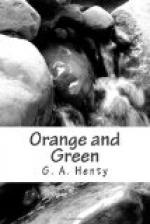Captain Davenant’s troop had shared in the disaster inflicted by the night attack upon the cavalry camp. All were asleep when the English cavalry burst upon them. Taken utterly by surprise, and ignorant as to the strength of the force by which they were attacked, there was no thought of resistance. Officers and men leapt from the piles of rushes, which served as beds, and rushed to their horses. The English troopers were cutting and hewing in all directions, and, cutting the picket ropes, each man sprang on his horse and rode for his life.
Captain Davenant had, at first, shouted to his men to keep steady; but his words were lost in the din which prevailed, and, seeing that nothing was to be done, he said to Walter:
“It is all over, Walter. We must ride for it, like the rest.”
By morning, the Irish cavalry was scattered all over the country, and it was not for two or three days that they again assembled in regiments, presenting a sorry sight, the greater part having lost saddles and accoutrements of every kind. A few troops, composed of men who had been fortunate enough to have left their horses saddled when night came on, were sent back to Limerick. The rest drew off towards Ennis, and encamped there until they could procure saddles and accoutrements to take the field again.
In Captain Davenant’s troop there were but six men who had saved their saddles; and, as it would have been useless to send so small a detachment to Limerick, these remained with the troop, and were, at Walter’s request, placed entirely at his disposal, in order that with them he might make scouting expeditions in the enemy’s rear. He had permission to consider himself entirely on detached service, and to join any body of rapparees he might choose; but this Walter did not care about doing, for he had a horror of the savage acts which were perpetrated by the irregular forces on both sides, and determined to confine himself to watching the roads, bringing in news of any convoys which might be traversing the country, and cutting off messengers going or returning with despatches.
The service was one of no great danger, for parties of peasants were on the watch, night and day; and, the instant any movement was observed, they started off at full speed to warn all the inhabitants of the surrounding villages to drive away their cattle, and carry off their effects into the hills or into the heart of some neighbouring bog, where the cavalry would not venture to penetrate.
One day when, with his little band, he was halting at a village, some ten miles in rear of the camp, a peasant ran in.
“A party of their horse have just seized some carts laden with potatoes at Kilcowan, and are driving them off. The boys are mustering to attack them on their way back.”
“It is too bad,” Walter exclaimed. “Only three days ago, Ginckle issued another proclamation guaranteeing that no provisions, or other goods, should be taken by his soldiers without payment.




